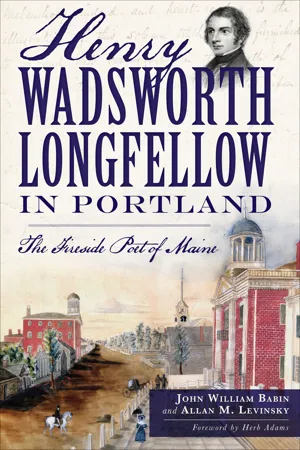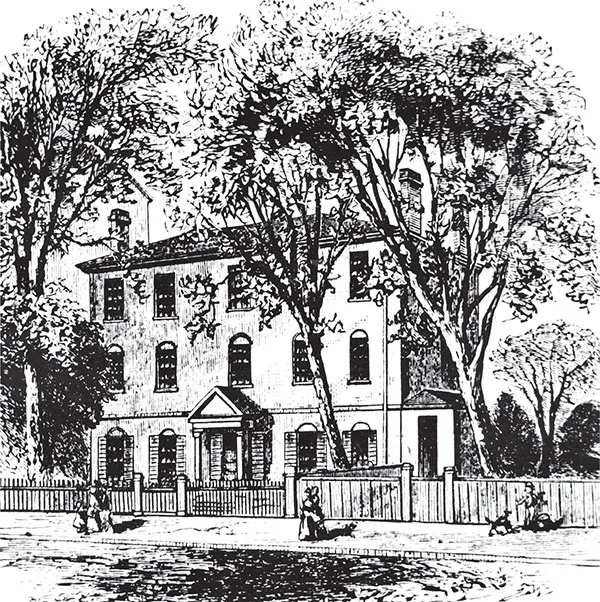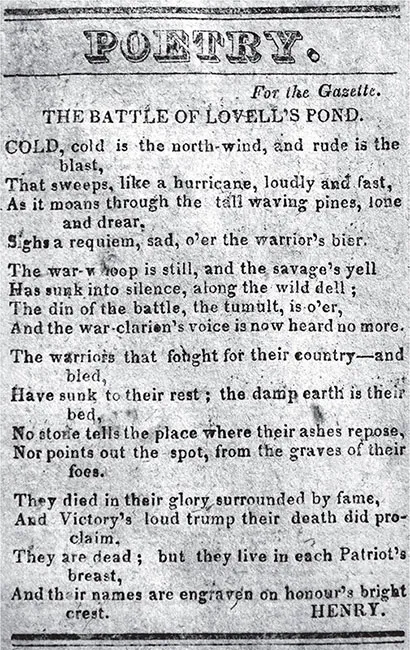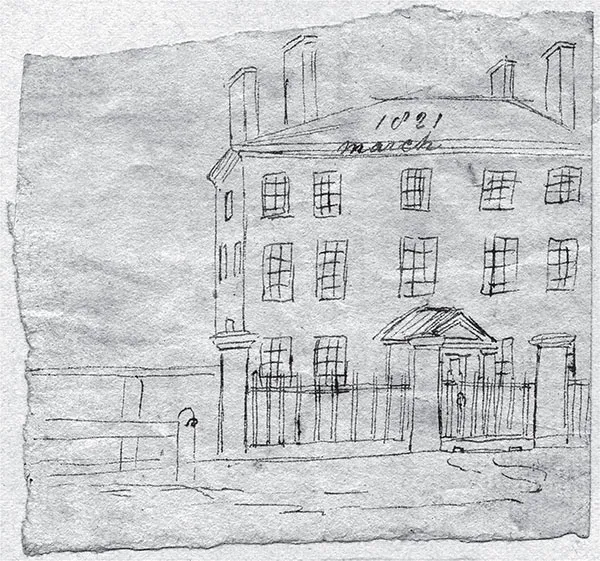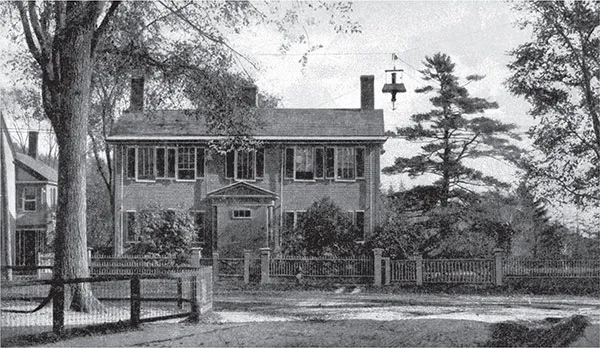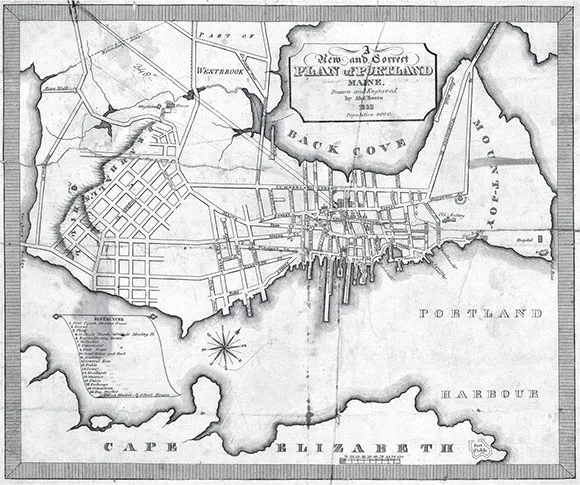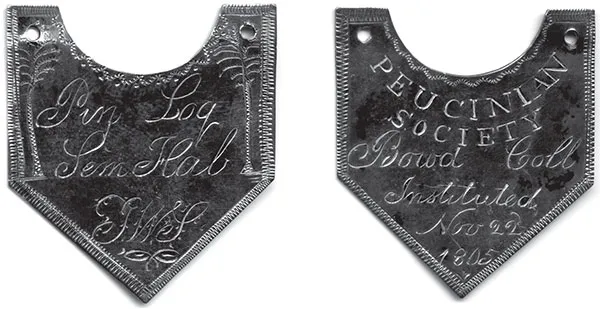![]()
THE POET AND COLLEGE
In the Portland home, at the age of thirteen, Henry Wadsworth Longfellow wrote a poem called “The Battle of Lovell’s Pond,” a story that he remembered his grandfather Peleg Wadsworth would tell him on his visits to his home in Hiram, Maine. The location of the battle took place not far from the Hiram home in 1725.
The work is the first published poem by the young poet who only signed “Henry” at the bottom of the piece, which appeared in the local newspaper called the Portland Gazette. The story of the poem is that on the evening of the publication, Henry was visiting at the home of schoolmate Frederic Mellen. Frederic’s father, Judge Mellen, commented about the poem, calling it “[v]ery stiff, remarkably stiff; moreover, it is all borrowed, every word of it.” The comments of the judge did not settle well with the poet, but he did not let on to the judge that he was author of the said stiff and borrowed poem. Later, he asked his mother, Zilpah, to read the poem for her honest opinion.
The Portland Gazette piece reads:
Poetry. For the Gazette. THE BATTLE OF LOVELL’S POND. Cold, cold is the north wind, and rude is the blast, That sweeps, like a hurricane, loudly and fast, As it moans through the tall waving pines, lone and drear, Sighs a requiem, sad, o’er the warrior’s bier. The war—whoop is still, and the savage’s yell Has sunk into silence, along the wild dell: The din of the battle, the tumult, is o’er, And the war—clarion’s voice is now heard no more. The warriors that fought for their country, and bled, Have sunk to their rest; the damp earth is their bed, No stone tells the place where their ashes repose, Nor points out the spot from the graves of their foes. They proclaim; They are dead; but they live in each Patriot’s breast, And their names are engraved on honor’s bright crest. Henry.
A similar poem by Thomas C. Upham called “Lovellspond” appear in a collection of Upham’s called American Sketches.
In 1821, Henry graduated from the Portland Academy at the age of fourteen. Stephen and young Henry then enrolled at Bowdoin College in Brunswick, Maine. Stephen was sixteen. In 1821, Portland High School was established, originally as a boys’ school. The Cumberland and Oxford Canal was chattered by local merchants but would not open until 1832.
Drawing of the Wadsworth-Longfellow House in Portland, donated to the Maine Historical Society by Anne Longfellow Pierce. Courtesy of the Collections of Maine Historical Society.
The Battle of Lovell’s Pond.” Courtesy of the Collections of Maine Historical Society.
A sketch of the Wadsworth-Longfellow House on Congress Street in Portland portrays the house as it was in March 1821. Courtesy of the Collections of Maine Historical Society.
Henry’s parents, Stephen and Zilpah, felt that Henry was much too young for college life and living away from home, so they made arrangements with Bowdoin College for the two boys to remain in Portland for their freshman year of college, along with their neighbors’ son Edward “Ned” Preble. The three of them would be tutored by their old Portland Academy schoolmaster Bezaleel Cushman. In the fall of 1822, Stephen and a fifteen-year-old Henry arrived in Brunswick, Maine, along with Ned Preble, to begin their second year of studies at Bowdoin College. The dormitory, Maine Hall, could hold only 50 students of the 120 boys attending that year. Their father made arrangements for Henry and Stephen and their friend Ned to stay with Reverend Benjamin Titcomb. The rooms in winter were cold, and the fireplace was the only source of heat. Henry made a request to his sisters in Portland to make him some curtains to cover the drafty windows and provide some art for the walls. Henry also wrote to Stephen and Zilpah, describing college life:
BRUNSWICK SEPTEMBER 22ND 1822
Dear Parents,
As we have now got comfortably settled, I suppose it is about time to let you know how we go on here. I feel very contented, and am much pleased with College Life. Many of the students are very agreeable companions and, thus far, I have passed my time very pleasantly. The students have considerably more leisure than I expected, but as the season advances and the days grow shorter, our leisure moments must necessarily be considerably diminished. I expected, when I got here that I should have to study very hard to keep a good footing with the rest of the class; but I find I have sufficient time for the preparation of my lessons and for amusement, and that I am not more deficient than some of the rest of the class. I have not been screwed at recitation yet and shall endeavour not to be.
So much for egotism!
I have very little more to write, but I will not to forget to mention that by some means or other, I cannot tell what, I have either lost on my passage here, or left at home, all my cotton stockings except the one pair which I wore—and another thing is that I wish some one would get a brass ferrule put on to my cane and send it to me as soon as possible. If you have any good apples or pears I wish you would send me some—and tell the girls to send a whole parcel of Ginger bread with them. My box of tooth powder may also be put into the bundle.
Your’s affectionately,
H.W.L.—
P.S. There is another thing of considerable importance, which I had like to have forgotten.
You do not know how much we stand in need of a good Watch. When the chapel bell rings for recitation it is only struck a few times and then is done, so that we, living so far from the College Building, are liable to be late—however we must do the best we can. Give my love to all and tell the Girls to write soon.
Postcard of the house where Henry Wadsworth Longfellow roomed while a student at Bowdoin College in Brunswick, Maine. Courtesy of the Collections of Maine Historical Society.
The boys had to be at the college for 6:00 a.m. prayers and then their first recitation before they could return to the home of Reverend Benjamin Titcomb for breakfast.
The year 1822 is also when the Maine Historical Society was founded, making it the third oldest in the country. Massachusetts is the oldest, founded in 1792. New York is the second-oldest historical society, founded in 1804. Stephen Longfellow, along with Court Justice Prentiss Mellen and Governor William King, were all founding members of the Maine Historical Society. In later years, father Stephen would serve as the Maine Historical Society president and Henry Wadsworth Longfellow as the society’s librarian.
In this next letter from December 1822, Henry writes to his mother about the cold days and nights. Not mentioned in this letter was that at one time, during a cold spell, Henry felt as though he was not getting enough exercise. So, drawing an image on the door, Henry would put on his boxing gloves and spar at the figure for exercise:
BOWDOIN COLLEGE. DECEMBER 7, 1822
My Dear Mother,
I received your letter of Novr 26—as returning from church, last Sunday. And now see what a scurvy trick Fortune (or rather Misfortune) has played me. The reason of my silence concerning our return at Thank{s}-giving was, that I wished to take you by surprise—and therefore said nothing, but kept you in doubt. You see how it ends. We are disappointed in our mode of conveyance and forced to remain. And there in lies the rub. I do not know when I have passed a week so unpleasantly or when time has lagged so much or hung so heavily upon my hands. First, the disappointment was a serious evil: added to this the long succession of cold days and cold nights—frozen ears—cold feet and a thousand other “ills the flesh is heir to”—all these make it dull living in this dreary region of the East. Heigh-ho for vacation. We ate our Thanksgiving dinner at Professor Cleaveland’s; the professor was very sociable but I had rather by half have dined at home. I am very sorry to hear that Betsey has been indisposed and hope she has quite recovered again. I have not got well yet and what is more, do not see prospect of “a speedy recovery.” However I make two meals on “pudding and milk,” that is one good thing! We have fixed our fire-place as you mentioned. I think it may be advantageous as it respects warming the room, but the chimney is more inclined to smoke and that, you know, is about as disagreeable as cold is—but to have both is rather too bad. You say you can excuse the shortness of the letters. Be so kind as to excuse the shortness of mine! My love to all.
Your affectionate son
Henry.
PS. The letters I received by Mellen and Preble, I shall answer soon.
Classmates Frederic Mellen and Ned Preble brought the letters from Portland after returning from the Thanksgiving holiday.
Henry and Stephen returned to Portland for the next school break. While on the midterm holiday, Henry wrote a letter to his classmate Cullen Sawtelle of Norridgewock, Maine, remarking how
the two week have spilt rapidly away and agreeable too—the particulars when we meet again. An evening or two ago I had the pleasure of seeing a sketch of your beautiful village of Norridgewock—and I assure you I was greatly delighted with it. If it is in reality as beautiful and pleasant as it seemed from that sketch to be, it is just such a village as I should like to live—die—and be buried in. I know nothing so delightful as retiring from the smoke, noise, and dust of the town to the green fields of the country—tho’ many prefer the town—noisy and dusty as it is. I feel pretty confident that life would wear smoothly away—with me—could I dwell in a neat country-house—upon the borders of some lake or river in the enjoyment of rural retirement—but this is mere talk!!
But Portland in 1823 was changing, as the poet wrote to his friend: “A new and correct plan of Portland, 1823 is drawn and engraved by Abel Bowen, this map shows the names of the streets, buildings, wharves, and the rope walks of Portland.” Henry also wrote about the ropewalk in a poem:
FROM “THE ROPEWALK”
In that building, long and low,
With its windows all a-row
Like the port-holes of a hulk,
Human spiders spin and spin,
Backward down their threads so thin
Dropping, each hempen bulk.
At the end, an open door:
Squares of sunshine on the floor
Light the long and dusky lane;
And the whirring of a wheel,
Dull and drowsy, makes me feel
All its spokes are in my brain.
As the spinners to the end
Downward go and reascend,
Gleam the long threads in the sun;
While within this brain of mine
Cobwebs brighter and more fine
By the busy wheel are spun.
Portland’s first Irish organization was formed in 1823, called the Roman Catholic Society according to the Portland City Directory. The great Irish famine of the 1830s forced many Irishmen to leave their country as a matter of survival, and they headed for America and Portland in numbers that greatly exceeded those of immigrants from other parts of the world. By 1860, they made up 11 percent of the city’s total population.
Drawn and engraved by Abel Bowen, this map shows street names, buildings, wharves and ropewalks of Portland, 1823. Courtesy of the Collections of Maine Historical Society.
In February 1823, Henry returned to Bowdoin College. After a six-hour stage ride, he remarked in a letter how very pleasant the ride was but also how he longed for spring and warmer days, as he enjoyed long walks in the woods: “I am only waiting for spring when we shall have warmer days—and more leisure, to enjoy myself.” Henry was quite sick at times during his college years, remarking that he felt his best when on a pudding and milk diet, and he requested to his sisters to bake an oven full of molasses gingerbread. In a letter to his mother from Bowdoin College on March 1, 1823, he wrote, “I begin to think my health is some better than when I last wrote. As to pills—I would take them if you will send them to me but I do not want to taste any more of Brunswick medicine; I have had quite enough of that already.”
Henry Wadsworth Longfellow’s Peucinian Society medal, 1822. Courtesy of the Collections of Maine Historical Society.
On March 4, 1823, father Stephen was elected to the Eighteenth Congress as an Adams-Clay...
